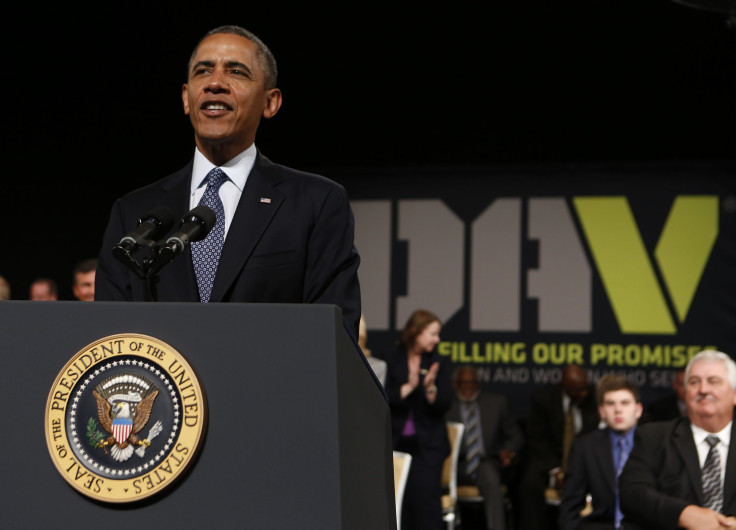President Obama Promises Disabled Veterans Aid, As More Seek Compensation For Agent Orange Exposure

On Saturday, President Obama addressed 3,400 attendees at the annual Disabled American Veterans Convention in Orlando, Fla., promising to streamline the backlogged disability claims system for illness and injury resulting from military service and committing more support for returned veterans at home.
In his speech, President Obama addressed the needs of veterans who have experienced illness and injuries caused by military service, proposing more research for traumatic brain injury, post-traumatic stress disorder, and suicide among veterans. Speaking to the general population returned service members, including those who recently returned from Operation Enduring Freedom and Operation Iraqi freedom, he spoke of the administration's commitment to helping veterans earn college degrees and get high-skills job training.
Of particular concern to his audience is the current backlog of disability claims for compensation for illnesses and injuries resulting from military service. Currently, there are 780,000 claims pending in the system administered by the Department of Veterans Affairs. Of those, 500,000 are considered backlogged, having been in the system for more than 125 days, a number that is down from 611,000 in March.
Read more: Prolonged Exposure Therapy Could Help Veterans With PTSD Face Their Fears?
Efforts to reduce the backlog of claims already in effect include requiring claims processors to work overtime and the use of a new computerized system intended to help speed the process. Secretary of Veterans Affairs Eric Shinseki promised to eliminate the backlog by 2015.
“So after years when the backlog kept growing, finally the backlog is shrinking. In the last five months alone, it’s down nearly 20 percent," Obama said in his remarks to loud applause. “After years of military service, you shouldn’t have to wait for years for the benefits you have earned.”
Agent Orange: The Culprit In Service-Related Disability
The backlog amassed in part because of a recent liberalization in policies related to disability claims that allowed for more Veterans to file for illnesses related to exposure to Agent Orange, an herbicide used widely during the Vietnam War.
The herbicide was transported and sprayed on foilage, by military personnel, in order to destroy forest cover that guerilla fighters would otherwise use to hide. Since the war, Agent Orange has been associated with several diseases, including various cancers, type II diabetes, Parkinson's, and ischemic heart disease. One of the most toxic byproducts of the compound, dioxin TCDD, has been recognized by the Environmental Protection Agency as a known carcinogen.
Read More: Prostate Cancer in US Veterans Linked To Agent Orange
In 2010, under the Obama Administration, veterans exposed to Agent Orange could more easily file for claims. Veterans suffering from certain diseases and experience in exposure locations are "presumed" to have acquired their condition from military service, and no longer bear the burden of presenting evidence of association.
Long Waits For Compensation
But an unintended consequence of allowing more veterans to file for disability is the wait they face in processing their claims. Aside from a long waits, some members of the military still get denied the help they deserve.
Paul Bailey, a retired Air Force lieutenant colonel, flew C-123 aircraft used during the Vietnam War after the war was over in cargo missions throughout the U.S. The aircraft was used to transport Agent Orange during the Vietnam War, yet the dioxin residue remained in the aircraft, confirmed by tests in 1994. Bailey now suffers from prostate cancer and metastatic cancer of the pelvis and ribs. He was originally denied disability benefits, out of an absence of policy on postwar exposure.
Last week, the Veterans Affairs reversed their decision, and now Bailey will receive compensation, which will allow his wife to stay in their home after he dies.
"The financial and emotional support this provides is just tremendous," Bailey said in an interview with The Washington Post. "It takes a huge burden off me."



























